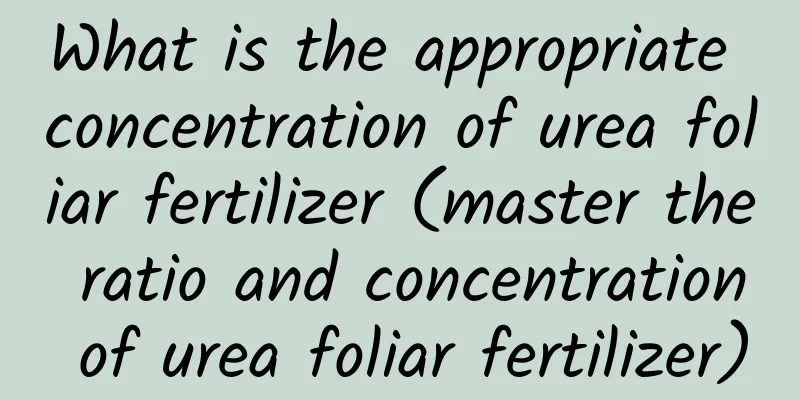What is the appropriate concentration of urea foliar fertilizer (master the ratio and concentration of urea foliar fertilizer)

1. Why can urea be used as foliar fertilizer?1. Urea is a quick-acting fertilizer with high nitrogen content and stable chemical properties. It works well as foliar fertilizer or topdressing. 2. Fast absorption. In the early stage of crop growth, especially some green leafy plants, the demand for nitrogen is large. Soil topdressing not only easily damages the root system, but also has a slow absorption and conversion rate. Ordinary granular fertilizers cannot be directly absorbed after entering the soil. They need to be transformed for a week to be converted into elements that can be absorbed by the root system. This can also be understood as decomposition. For this reason, spraying urea is particularly suitable for crops that need nitrogen deficiency. 2. What should we pay attention to when using urea as foliar fertilizer?First, concentration dilution Fruits and vegetables have different fertilizer requirements, so when using urea as foliar fertilizer, you should pay attention to the concentration. Second, improve the absorption rate In order to promote better and faster absorption of urea, some foliar fertilizer enhancers can be added to the diluted solution to increase the adhesion of nutrients on the leaves, such as Dehua silicone instant treatment and fission, which can effectively prevent high temperature and rainy weather. Third point, spraying time The time to spray foliar fertilizer should pay attention to the characteristics of crops. The main element of urea is nitrogen, which is more needed in the seedling stage or before flowering. Daily spraying can be done before 10 o'clock in the morning and in the evening, usually once every half a month. Fourth point, spraying site When spraying urea as foliar fertilizer, the nozzle should be pointed upwards and slanted towards the back of the leaves. This can increase the nutrient absorption rate. The following operation method will result in insufficient nutrient absorption. 3. How to use urea as foliar fertilizer1. Cereals The spraying concentration is 1.5-2% , that is, add 1.5 kg to 2 kg of urea granules to 100 kg of clean water. When spraying during the flowering period, the concentration of urea should be lower, and the fertilizer liquid can be sprayed on 5 mu of land. 2. Leafy vegetables For example, the spraying concentration for vegetables and cucumbers is 1-1.5% , that is, 1 kg to 1.5 kg of urea granules are added to 100 kg of water. 3. Fruit trees, apples, pears, grapes, etc. For fruit trees, 0.5% is appropriate , that is, add 0.5 kg of urea fertilizer to 100 kg of water and stir thoroughly to dissolve. 4. Solanaceae The best spraying concentration is 0.3% , that is, add 0.3 kg or 6 taels of urea to 100 kg of water. |
<<: When to plant melons outdoors (tips and techniques for planting melons outdoors)
>>: Why do tomatoes grow cracks? (Why do tomatoes grown at home tend to crack easily?)
Recommend
Can copper coin grass be raised underwater? Can it grow underwater?
1. Can it be raised underwater? Pennywort can be ...
Comprehensive knowledge on lavender care
Pruning Newly planted lavender grows slowly in th...
How to plant ivy? Planting time and method
Ivy Planting Time The time for planting ivy is ge...
How much does corn drip irrigation cost per acre (corn field drip irrigation cost)
Compared with traditional ditch irrigation, corn ...
The cultivation methods and precautions of Long Xuelan
1. Maintenance methods 1. Soil: Sandy soil is oft...
In the hot summer, learn about making homemade popsicles. They can be made in 2 minutes, delicious and economical!
Red bean milk popsicles When Huahua was a child, ...
Home Decoration of Ficus Ginseng
Feng Shui Meaning of Ficus Ginseng From the persp...
How to grow a potted rubber tree
1. Pot soil selection Because its root system is ...
How to grow succulents more vigorously in summer?
June and July every year mark the hottest period ...
How to grow Chlorophytum comosum in autumn
1. Regulate the amount of watering The amount of ...
The efficacy of mint and how to eat mint
1. Basic Introduction Mint is a plant of the Lami...
Who can't drink honeysuckle tea? The correct way to drink it
1. Who should not drink honeysuckle tea? 1. Infan...
Is the plant that likes shade or sunlight?
Does Jade Dew prefer shade or sun? Jade is a semi...
How to grow papaya begonia
1. Alkaline loam The loam suitable for it needs t...
How to clean orchid leaves
1. Rainwater flushing It is said that spring rain...









